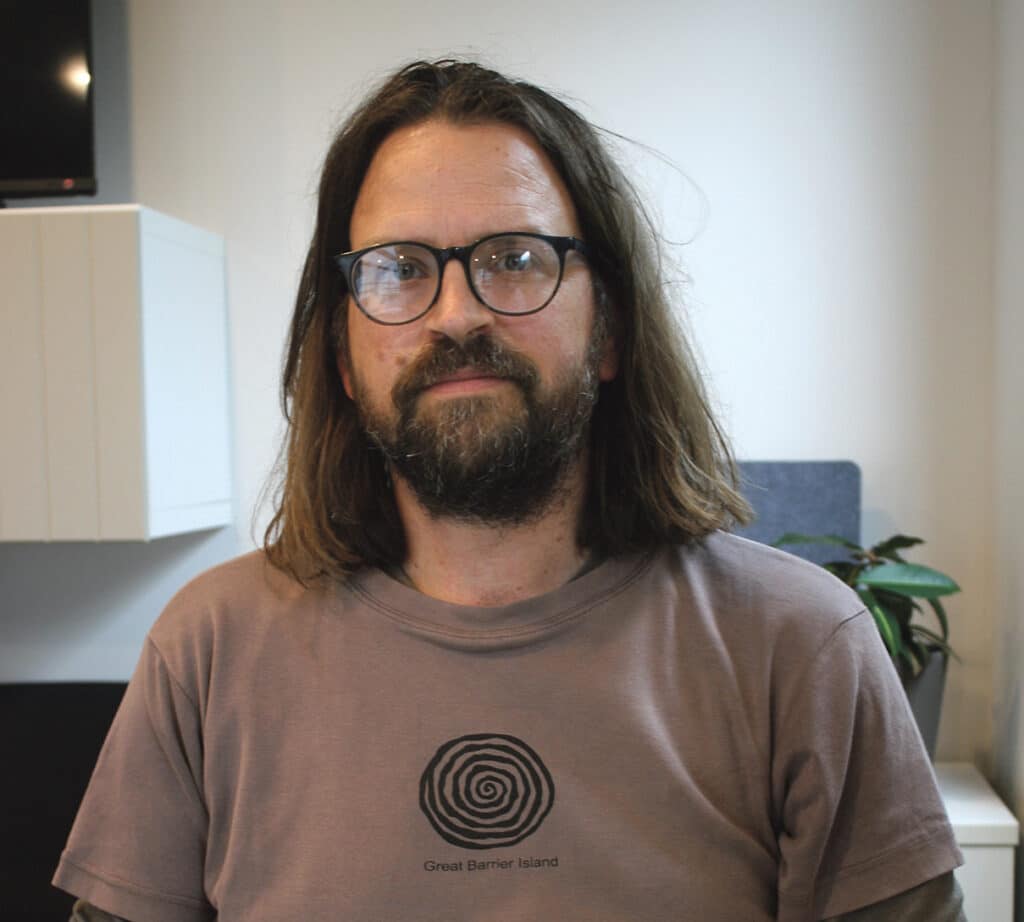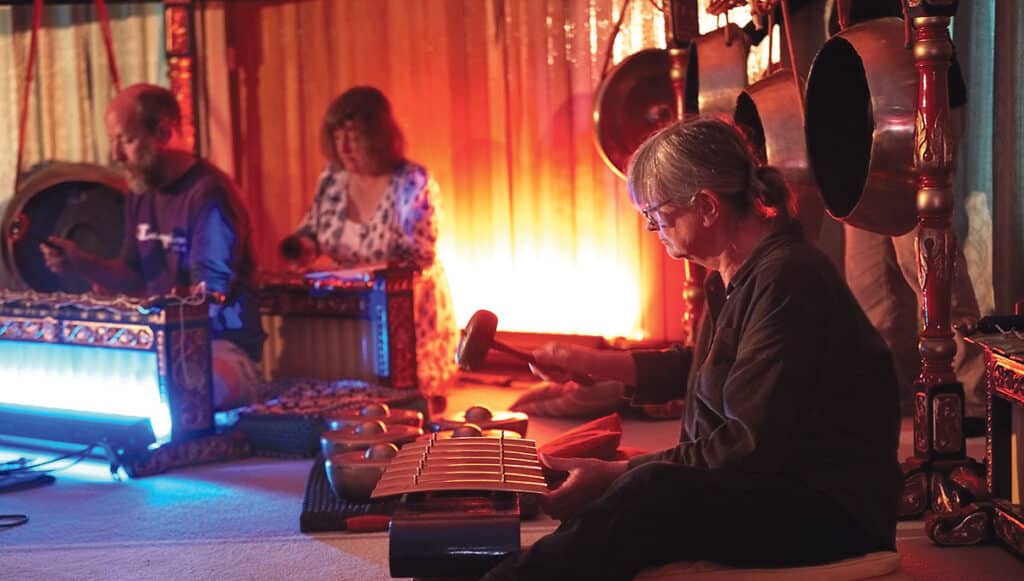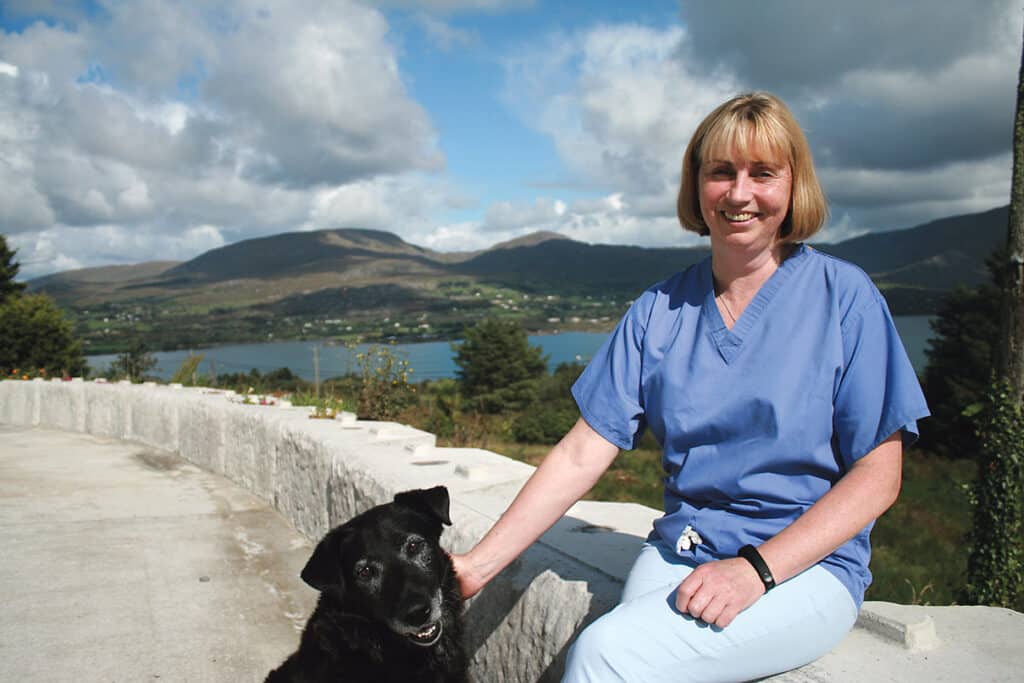The effects of music to our wellbeing are known to be far-reaching, from reducing anxiety and pain to improving memory and mood. Who hasn’t thrown on a tune on a grey winter’s day and felt the better for it? Going a step further in actually making music, particularly in a community setting, can have a positive effect on our emotional wellbeing, as well as improving our social connectedness. Since 2016, West Cork is fortunate to be home to the only Irish gamelan outside of a university city, with people from all walks of life in the area regularly coming together to play on this unique set of percussion instruments. Gamelan Spréacha Geala (Bright Sparks Gamelan) is a community music group, which meets weekly in Skibbereen to play and enjoy the music, the socialising, and the effect the sound has on their emotional state. Gamelan Spréacha Geala director Dr Kevin McNally chats to Mary O’Brien about the group, his own musical journey and the importance of keeping the tradition of playing music in a community setting alive, not only for our wellbeing but for our cultural heritage.


Originally from Carrigaline, Kevin McNally moved to Clonakilty with his partner, Eithne O’Mahony, in 2007. The couple, both musicians, who were in New Zealand at the time, yearned to live in a small place like Clonakilty where they could lead a life rich in culture. “New Zealand is a beautiful amazing country but we just missed Irish culture and arts too much,” explains Kevin. “A place like Clonakilty and West Cork doesn’t exist there.
“There is still a value placed on creativity for creativity’s sake in West Cork…An acknowledgement that making music is a worthwhile activity in and of itself.
“The more our community moves towards this homogenous internet society, the more we will take on that anglo-American attitude of categories – ‘music is just for musicians’ for example. “The point of music is not to play all the notes right, the point is to share and create a feeling in the room that everyone is enjoying.”
From DeBarra’s in Clonakilty to O’Donovan’s at Fisher’s Cross near Ardfield, the couple are now regulars at local pub music sessions. “These are people who are coming together, coming out just to share music and enjoy each other’s music and anyone is welcome to join in,” shares Kevin. “For me that’s a great example of how music is valued for its own sake because when we play music together we all feel good, it takes us out of ourselves and connects us to other beings, to something bigger than us.”
A lecturer in gamelan and Irish music at UCC, Kevin is also a musician and composer of music, a guitarist, and seasoned gamelan player. Since moving to West Cork, he has collaborated on a number of music groups and events, from the West Cork Ukulele Orchestra to the Clonakilty International Guitar Festival. He is the Assistant Director of the Irish Gamelan Orchestra and Director of the West Cork Gamelan Spréacha Geala.
For Kevin, music has always been a way of engaging with the world, in particular the metaphysical, giving him a greater sense of self. “For some people, church or spirituality offers a way of getting in touch with the numinous, for others it could be drugs; for me it has always been music,” shares Kevin. Music helped him develop from a shy teenager into a confident musician. “Although I still can’t do small talk,” he says laughing.
Starting out as a folk and classical guitarist, Kevin went to UCC to study music and came out the other side an ethnomusicologist – someone who studies the music of all cultures – although he still thinks of himself primarily as a musician. It was at UCC that he discovered the rich and living tradition of Irish music and also the compelling sound of the gamelan.
From the 1960s on, firstly under Seán ó Riada and later Micheál Ó Súilleabháin, the music department at UCC placed a big emphasis on all musics being equal, which was incredibly radical for that time. “UCC was the first place you could, as a traditional musician, get a degree in music. From that grew a respect and awareness for all types of musical cultures,” shares Kevin.
With this tradition carried on at UCC under Professor Mel Mercier, the gamelan was introduced to incoming students like Kevin, who entered his first year of college at the same time a Javanese musician was visiting for the year. “So when I got introduced to gamelan music, which I knew nothing about, it was in this really rich environment where there was a lot of performance going on,” he explains. “Although the music was completely foreign to me, I loved the cohesion of the group and the atmosphere that was generated by the people and the instruments.”
In third year of college, a scholarship brought Kevin for a summer to Java, the home of gamelan and, with close to 100 million inhabitants, the most populated island in Indonesia and one of the most densely populated regions in the world. It supercharged his knowledge and interest in the music.
“It was a totally overwhelming experience, a complete culture shock – living cheek by jowl with people was very unfamiliar to me coming from Ireland – but I came back with a new understanding of the music and culture,” he says.
Attracted by this way of making music, where all of the basic building blocks taken for granted in music just aren’t there or don’t apply, Kevin says that it completely expanded his concept of what music could be. It also opened up his mind to the fact that there are things that happen in society that are reflected in music and the other way around “A feedback cycle,” he shares.” In Java everyone has a job to do; similarly in gamelan music there is a role for everybody, everybody is brought along and it’s not about valorising the best individuals in a group. It’s very inclusive.”
Thinking back, he remembers the rich ecology of sound in Java – from the music on the wind and the streets to the sounds of the street vendors, calls of prayer, insects and traffic.
Ecology came up again when he was recently completing his PhD in Community Music: His findings relating that what music creates is something he has coined the ‘atmosphere of affect’ or structures of feeling. “Music can structure the attitude you have to something,” he explains “For example, the structure of gamelan is one of safety, support and connection, which is all positive.”
On a personal level as a musician, Kevin found himself exploring themes of ecological worry and collapse. “Because I was doing it through music, which created this lovely structure of feeling, I was able to deal with it without that sense of grief or worry or panic that often comes with talking about climate issues,” he says.
“Sounds facilitate a structure of feeling like support, care and connection. Restructuring our feelings towards things, it touches us somewhere very deeply and opens up these channels of communication and empathy.”
Gamelan is a generic term that refers to orchestras of tuned ‘gong chime’ percussion instruments such as bronze gongs, xylophones and metallophones, which create a mesmerising sonic adventure. Unlike other types of musical ensemble, the musicians arrive to the gamelan empty-handed, with participants, not specialising in one, but eventually learning to play all of the instruments. With only five notes, it’s literally impossible to play the wrong note in gamelan, so as a result it’s very inclusive. “If you can hit something, you can play gamelan,” explains Kevin. “The instruments do all the work.
“It’s extremely effective as an orchestra for people who don’t consider themselves musicians, as it’s welcoming of failures and mistakes.”
Participants of Gamelan Spréacha Geala based in Skibbereen – which is always welcoming to new people – have described the experience as “really grounding and inspiring at the same time”; “The vibration kind of hits different parts of you sometimes somehow, maybe resonates with your heart or your lungs on a subconscious level. Definitely you feel it”; “I think for me, something delightful and very soulful and soothing would be three words I would put to my first impression”.
“The repetition of the sounds lends itself to this slowing down feeling of getting into yourself,” says Kevin. People have described it as being transportive, as they lose all sense of time and feel part of something larger.”
While he points out that gamelan is not a therapy or prescription, Kevin does believe there are somatic benefits to it, as it can invoke a feeling of calm. “It’s also a way of communicating without speaking and still having that sense of connection to people.”
Kevin’s passion lies in demystifying music so that everyone can have access to it, which is one of the reasons he originally set up the West Cork Ukulele Orchestra and, most recently the Reverb programme, as part of the Clonakilty International Guitar Festival, which brings music off stage and out into the community, to places like schools and hospitals.
“Music is not that complicated and it doesn’t have to be perfect,” he emphasises. There shouldn’t be any shame about not being able to play an instrument well or sing well. Music is about getting together, having fun and sharing.
“It’s there, it’s for everybody. We have to hold on to that in Ireland.”



